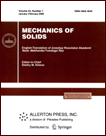 | | Mechanics of Solids
A Journal of Russian Academy of Sciences | | Founded
in January 1966
Issued 6 times a year
Print ISSN 0025-6544
Online ISSN 1934-7936 |
Archive of Issues
| Total articles in the database: | | 13427 |
| In Russian (Èçâ. ÐÀÍ. ÌÒÒ): | | 8178
|
| In English (Mech. Solids): | | 5249 |
|
| << Previous article | Volume 45, Issue 4 / 2010 | Next article >> |
| T.A. Belyakova, Yu.P. Zezin, and E.V. Lomakin, "Thermovisco-Hyperelastic Behavior of Elastomeric Materials Modified by Filler Nanoparticles," Mech. Solids. 45 (4), 546-561 (2010) |
| Year |
2010 |
Volume |
45 |
Number |
4 |
Pages |
546-561 |
| DOI |
10.3103/S0025654410040059 |
| Title |
Thermovisco-Hyperelastic Behavior of Elastomeric Materials Modified by Filler Nanoparticles |
| Author(s) |
T.A. Belyakova (Lomonosov Moscow State University, GSP-2, Leninskie Gory, Moscow, 119992 Russia)
Yu.P. Zezin (Institute of Mechanics, Lomonosov Moscow State University, Michurinskii pr-t 1, Moscow, 119192 Russia)
E.V. Lomakin (Lomonosov Moscow State University, GSP-2, Leninskie Gory, Moscow, 119992 Russia, evlomakin@yandex.ru) |
| Abstract |
We present the results of experimental studies of hyperelastic and relaxation properties of polymer composites with elastomeric matrix made of hydrogenated nitrile butadiene rubber filled with nanoparticles of technical carbon in the temperature range 19-150°Ñ. We present typical experimental diagrams of deformation of the material with constant strain rate and the stress relaxation curves at different strain levels under tension and compression conditions. We consider a possible version of constitutive relations for describing some singularities of the behavior of the material under study. We developed a method for determining all the parameters of the accepted relations on the basis of the results of uniaxial tests. We found a nonmonotone dependence of the relaxation modulus on the temperature and proposed a formula for describing this dependence in the temperature range under study. To justify the possible use of the considered constitutive relations to perform calculations under conditions of arbitrary compound stress state, we performed numerical modeling of the compression experiment for cylindrical samples. A rather satisfactory agreement between the computational results and experimental data was obtained. |
| References |
| 1. | V. I. Ivanovskii,
Technical Carbon. Processes and Devices. Tutorial Book
(OAO "Tekhnicheskii Uglerod", Omsk, 2004)
[in Russian]. |
| 2. | R. A. Turusov, M. M. Stratonova, and V. I. Min'kovich,
"Stress Relaxation in a Polymer Disk,"
Mekh. Polimer.,
No. 6, 1064-1070 (1971)
[Polimer Mech. (Engl. Transl.)
7 (6), 946-951 (1971)]. |
| 3. | S. A. Nassar and A. A. Alkelani,
"Clamp Load Loss due to Elastic Interaction and Gasket
Creep Relaxation in Bolted Joints,"
Trans. ASME J. Pressure Vessel Technol.,
128 (3), 394-401 (2006). |
| 4. | E. V. Lomakin, T. A. Belyakova, and Yu. P. Zezin,
"Nonlinear Viscoelastic Behavior of Filled Elastomeric Materials,"
Izv. Saratov Univ. Ser. Mat. Mekh. Inf.
8 (3), 56-65 (2008). |
| 5. | K. F. Chernykh and Z. N. Litvinenkova,
Theory of Large Elastic Strains
(Izd-vo LGU, Leningrad, 1988)
[in Russian]. |
| 6. | L. M. Yang, V. P. W. Shim, and C. T. Lim,
"A Visco-Hyperelastic Approach in Modelling the Constitutive Behavior of Rubber,"
Int. J. Impact Engng
24, 545-560 (2000). |
| 7. | LS-DYNA Theoretical Manual
(Livermore Software Technology Corporation, 1998). |
| 8. | R. S. Rivlin,
"Some Topics in Finite Elasticity,"
in Proc. of 1st Symp. Naval Structural Mechanics
(1960),
pp. 169-198. |
| 9. | P. M. Ogibalov, N. I. Malinin, V. P. Netrebko, and B. P. Kishkin,
Structural Polymers
(Izd-vo MGU, Moscow, 1972),
Vol. 1
[in Russian]. |
| 10. | A. A. Sokolovskii and E. M. Ukhova,
"Physical Chemistry of Elastomers. Thermomechanical Transitions and Vulcanizate Creep under Static Loads,"
Kauchuk Rezina,
No. 10, 10-12 (1984). |
| 11. | Z. Chen, J. L. Atwood, and Y.-W. Mai,
"Rate-Dependent Transition from Thermal Softening to Hardening in Elastomers,"
Trans. ASME J. Appl. Mech.
70 (7), 611-612 (2003). |
| 12. | A. A. Il'yushin and B. E. Pobedrya,
Fundamentals of the Mathematical Theory of Thermoviscoelasticity
(Nauka, Moscow, 1970)
[in Russian]. |
| 13. | J. D. Ferri,
Viscoelastic Properties of Polymers
(Wiley, New York, 1961; Izd-vo Inostr. Lit., Moscow, 1963). |
| 14. | Yu. S. Urzhumtsev,
Prediction of Long-Term Strength of Polymers Materials
(Nauka, Moscow, 1982) [in Russian]. |
| 15. | A. Moehlenpah, O. Isyai, and A. Dibenedetto,
"The Effect of Time and Temperature on the Mechanical Behavior of Epoxy Composites,"
Pol. Eng. Sci.
11 (2), 129-138 (1971). |
|
| Received |
05 March 2010 |
| Link to Fulltext |
|
| << Previous article | Volume 45, Issue 4 / 2010 | Next article >> |
|
 If you find a misprint on a webpage, please help us correct it promptly - just highlight and press Ctrl+Enter If you find a misprint on a webpage, please help us correct it promptly - just highlight and press Ctrl+Enter
|
|

 Russian
Russian  English
English